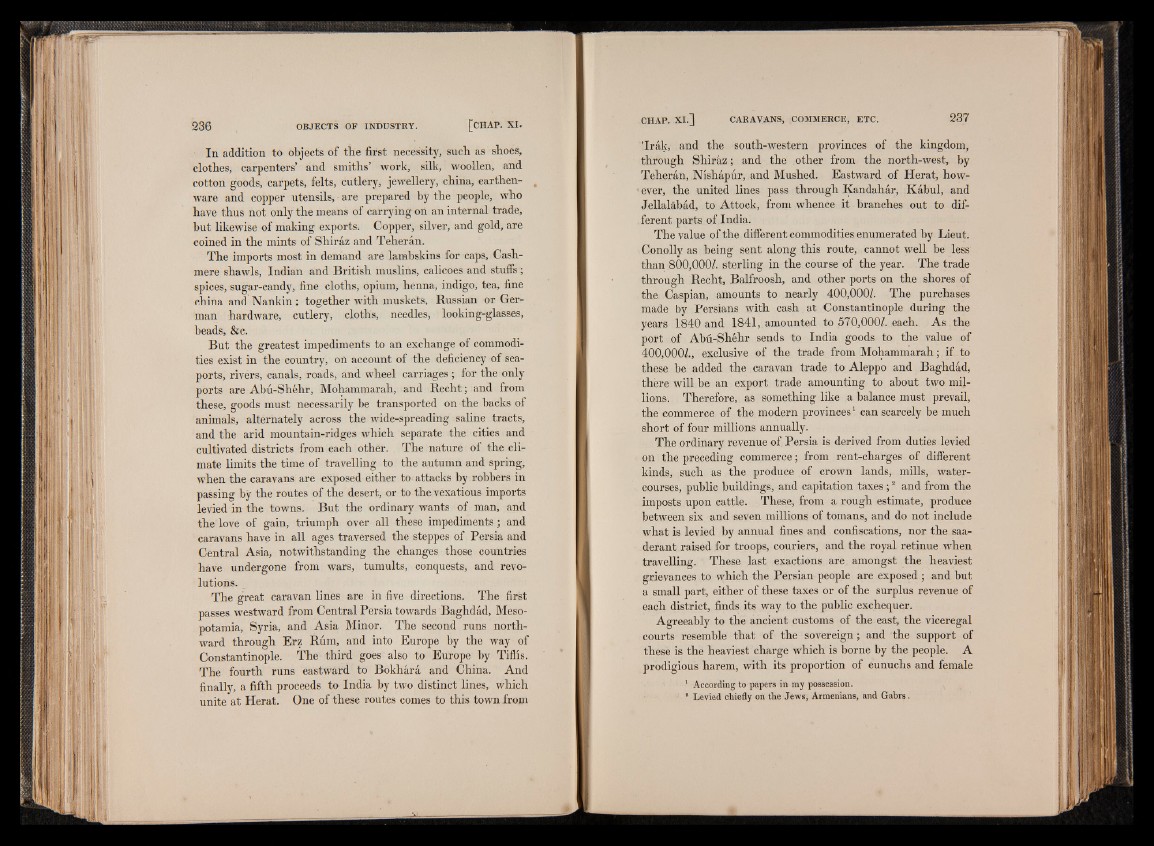
In addition to objects of the first necessity, such as shoes,
clothes, carpenters’ and smiths’ work, silk, woollen, and
cotton goods, carpets, felts, cutlery, jewellery, china, earthenware
and copper utensils, are prepared by the people, who
have thus not only the means of carrying on an internal trade,
but likewise of making exports. Copper, silver, and gold, are
coined in the mints of Shiráz and Teherán.
The imports most in demand are lambskins for caps, Cash-
mere shawls, Indian and British muslins, calicoes and stuffs;
spices, sugar-candy, fine cloths, opium, henna, indigo, tea, fine
china and Nankin; together with muskets, Russian or German
hardware, cutlery, cloths, needles, looking-glasses,
beads, &c.
But the greatest impediments to an exchange of commodities
exist in the country, on account of the deficiency of seaports,
rivers, canals, roads, and wheel carriages; for the only
ports are Abú-Shéhr, Mohammarah, and Recht; and from
these, goods must necessarily be transported on the backs of
a n im a ls , alternately across the wide-spreading saline tracts,
and the arid mountain-ridges which separate the cities and
cultivated districts from each other. The nature of the climate
limits the time of travelling to the autumn and spring,
when the caravans are exposed either to attacks by robbers in
passing by the routes of the desert, or to the vexatious imports
levied in the towns. But the ordinary wants of man, and
the love of gain, triumph over all these impedimentsand
caravans have in all ages traversed the steppes of Persia and
Central Asia, notwithstanding the changes those countries
have undergone from wars, tumults, conquests, and revolutions.
The great caravan lines are in five directions. The first
passes westward from Central Persia towards Baghdád, Mesopotamia,
Syria, and Asia Minor. The second runs northward
through Erz Rúm, and into Europe by the way of
Constantinople. The third goes also to Europe by Tiflis.
The fourth runs eastward to Bokhárá and China. And
finally, a fifth proceeds to India by two distinct lines, which
unite at Herat. One of these routes comes to this town from
’Irak, and the south-western provinces of the kingdom,
through Shiraz; and the other from the north-west, by
Teherán, Níshápúr, and Mushed. Eastward of Herat, how-
< ever, the united lines pass through Kandahár, Kábul, and
Jellalábád, to Attock, from whence it branches out to different
parts of India.
The value of the different commodities enumerated by Lieut.
Conolly as being sent along this route, cannot well be less
than 800,000/. sterling in the course of the year. The trade
through Recht, Balfroosh, and other ports on the shores of
the Caspian, amounts to nearly 400,000/. The purchases
made by Persians with cash at Constantinople during the
years 1840 and 1841, amounted to 570,000/. each. As the
port of Abú-Shéhr sends to India goods to the value of
400,000/., exclusive of the trade from Mohammarah; if to
these be added the caravan trade to Aleppo and Baghdád,
there will be an export trade amounting to about two millions.
Therefore, as something like a balance must prevail,
the commerce of the modern provinces1 can scarcely be much
short of four millions annually.
The ordinary revenue of Persia is derived from duties levied
on the preceding commerce; from rent-charges of different
kinds, such as . the produce of crown lands, mills, watercourses,
public buildings, and capitation taxes;2 and from the
imposts upon cattle. These, from a rough estimate, produce
between six and seven millions of tomans, and do not include
what is levied by annual fines and confiscations, nor the saa-
derant raised for troops, couriers, and the royal retinue when
travelling. ' These last exactions are amongst the heaviest
grievances to which the Persian people are exposed ; and but
a small part, either of these taxes or of the surplus revenue of
each district, finds its way to the public exchequer.
Agreeably to the ancient customs of the east, the viceregal
courts resemble that of the sovereign; and the support of
these is the heaviest charge which is borne by the people. A
prodigious harem, with its proportion of eunuchs and female
1 According to papers in my possession.
8 Levied chiefly on the Jews, Armenians, and Gabrs.